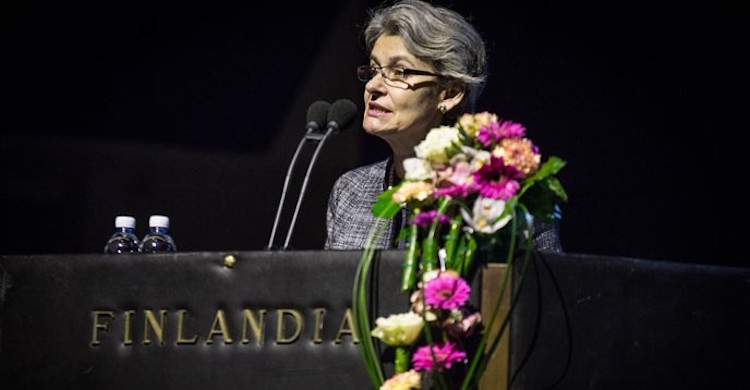Analysis by Rita Joshi
BERLIN | HELSINKI (IDN) – Press freedom and the right to information are essential for a free, independent and pluralistic media and crucial to the advancement of human rights and sustainable development, says the Finlandia Declaration adopted on World Press Freedom Day on May 3, 2016 during a three-day event in the Finnish capital Helsinki.
The event organized by the United Nations Educational; Scientific and Cultural Organization (UNESCO) was attended by more than 1000 media practitioners and stake holders, including representatives of governments. They endorsed the Declaration that recalls the 2030 Agenda for Sustainable Development of the United Nations, agreed by world leaders in September 2015 in New York. The Agenda envisages 17 Goals and 169 targets.
Goal 16 of the Agenda seeks to promote just, peaceful and inclusive societies, which includes key points relevant to press freedom, access to information, safety of journalists and the rule of law. It seeks to “ensure public access to information and protect fundamental freedoms, in accordance with national legislation and international agreements”.
The Declaration takes note of SDG target 16.10, which seeks to “ensure public access to information and protect fundamental freedoms, in accordance with national legislation and international agreements”, and recognizes this as relevant to achieving all SDG goals and in particular SDG 5 on gender equality.
Finlandia recognizes that the right to information is also vital to developing a free, independent and pluralistic media and essential to strengthening its capacity to counter hate speech, promote intercultural understanding, and fight radicalization and violent extremism.
The Declaration underlines the importance of acknowledging the role of women journalists and the specific threats they face, including sexualized violence and online and offline harassment.
The right to information is in fact critical for informed decision-making, for the right to participation in the conduct of public affairs, for monitoring of public actions, for reducing corruption, and for enhancing transparency and accountability, says the Declaration.
The Declaration welcomes initiatives such as the February 2016 UNESCO conference News organizations standing up for the safety of media professionals as well as the call for a Special Representative on Safety in the Office of the UN Secretary General, the International Declaration on the Protection of Journalists, and the Global Safety Principles and Practices.
Finlandia further recalls the initiatives of the Freedom of Information Advocates Network, the African Platform on Access to Information, and UNESCO’s 2015 Resolution declaring September 28 as International Day for Universal Access to Information; and encouraging all actors to ensure annual celebrations of this day.
The Declaration also calls on each UNESCO Member States:
“To reaffirm that press freedom and the right to information are essential for a free, independent and pluralistic media, and crucial to the advancement of human rights and sustainable development.;
“To create a legal, policy and institutional environment which ensures that people can receive public information, including through a constitutional right to information and through statutory and institutional mechanisms for implementation;
“To ensure that exceptions to the right to information, including secrecy rules, adhere to principles of international human rights such as legality, a legitimate purpose and necessity; and to ensure that there is transparency around the application of such limitations;
“To put in place strong systems for proactive disclosure of information, taking full advantage of Information and Communication Technologies (ICTs) and promoting, as far as possible, universal access to the Internet and respect for open data principles;
“To foster an enabling communications environment which supports the principle of self-regulation at all levels; and to preserve independence of public service broadcasting as one of the essential pillars of pluralism and access to information.”
The Declaration calls on civil society, journalistic actors and internet intermediaries: To raise awareness and build capacity among policy-makers, journalistic actors, citizens at large and vulnerable groups in particular, about the right to information as a fundamental human right and how it can serve democracy and sustainable development;
It also urges them to contribute to the dissemination of good practices and experiences showcasing the direct link between the right to information, ethical standards, quality journalism, accountable governance, media self-regulation, participation, limiting corruption and sustainable development.
The Declaration further stresses the need to promote and support investigative journalism and to raise awareness about the value of journalism in the implementation of the right to information; and encourage dialogues between media professionals and civil society players to raise awareness of the role of ethical and pluralist journalism in building respect for human rights and democracy. [IDN-InDepthNews – 4 May 2016]
IDN is flagship agency of the International Press Syndicate.
Photo: UNESCO Director-General Irina Bokova addressing the World Press Freedom Day Conference on May 3, 2016.
2016 IDN-InDepthNews | Analysis That Matters
Send your comment | Subscribe to IDN newsletter
Follow us on Twitter and Facebook:
http://twitter.com/InDepthNews
http://www.facebook.com/IDN.GoingDeeper

